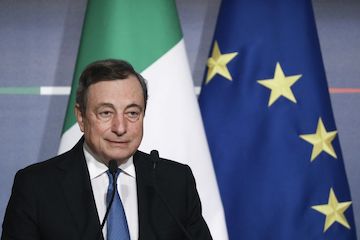Italian Prime Minister Mario Draghi said European companies will be able to pay for gas in rubles without breaching sanctions, apparently dismissing European Union guidance to the contrary.
European companies have been scrambling for weeks to figure out how they can meet Russia’s demand for ruble payments—and keep the crucial gas flowing—without breaking the sanctions designed to punish Moscow for the war against Ukraine.
EU officials have said companies should keep paying in euros, and that opening a ruble bank account would go against the rules. Still, the EU is yet to issue watertight written instructions on how companies should pay Gazprom PJSC.
“There is no official pronouncement of what it means to breach sanctions,” Draghi said during a press conference on Wednesday. “Nobody has ever said anything about whether ruble payment breach sanctions.”

“As a matter of fact, most of the gas importers have already opened their account in rubles with Gazprom,” he added.
The Russian decree called for companies to open two accounts—one in euros and one in rubles. Since that order, there have been signals from Gazprom seeking to reassure European buyers they can keep getting gas without breaking the EU rules.
Draghi also said that Germany’s top gas importer had already paid in rubles. Like Italy, Germany is a massive consumer of Russian gas.
“As a matter of fact the evidence we have seen yesterday, I think it’s of this morning, the largest gas importer in Germany has already paid in rubles,” he said.
A spokesman for Germany’s Uniper SE, the top buyer of Russian gas, said the company hasn’t made any payments under the new system as its payment deadline doesn’t fall until the end of May. Uniper said earlier on Wednesday that it’s confident it can comply with sanctions and keep the gas flowing. The spokesman declined to comment on whether the utility has opened a ruble account.
The EU published guidelines at the end of April, which companies and some governments have criticized as too vague. It has promised an update soon. But the clock is ticking as many firms have payment deadlines falling due later this month—and if they don’t pay they risk gas flows being cut off.
Poland and Bulgaria had their gas cut off after they refused to entertain President Vladimir Putin’s new terms. Other buyers have been seeking workarounds, with companies including Austria’s OMV AG signaling that a fix can be found.

Follow us on social media: